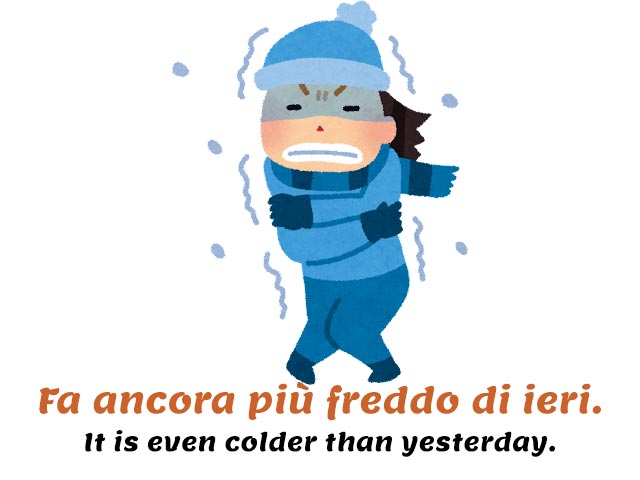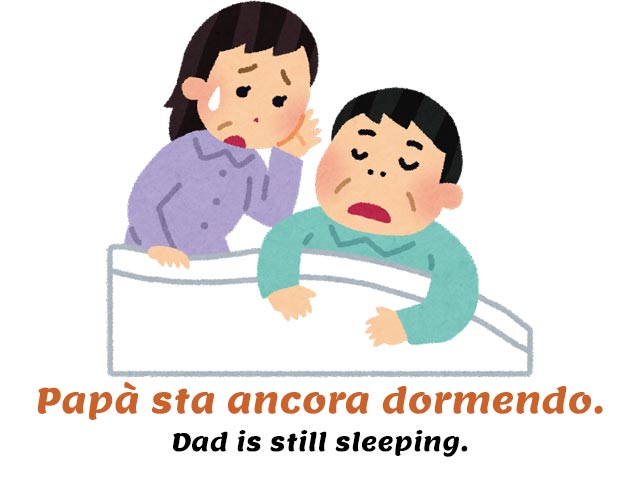Italian word of the day
Ancora is an adverb that can be translated into English as “again”, “still”, or also “even”. It has many meanings.
| Pronunciation | |
| English translation | Again, still, even… |
| Origin | From the Latin word hanc ho(ram), “still, again” |
Examples
| Grazie ancora per l’aiuto. | Thanks again for your help. |
| Aspetta ancora un minuto. | Wait one more minute. |
| Ho ancora fame. | I’m still hungry. |
| Non ho ancora lavato le tende. | I haven’t washed the curtains yet. |
| Oggi fa ancora più freddo di ieri. | It is even colder today than yesterday. |

Ancora in Italian: Usage
We’ve said that ancora in Italian is an adverb that translates English words such as “again”, “still” or “even”.
As “again”
Ancora in Italian is used to describe an action that we would like to do again, or something we’ve done again. This is similar to the expression di nuovo, also translating as “again”, “once again” or “one more time”.
| Sono stato a Parigi molte volte, ma vorrei tornarci ancora. | I have been to Paris many times, but I would like to go back again. |
| Prova ancora ad aprire la porta! | Try opening the door again! |
As “still”
When it translates as “still”, ancora in Italian describes an ongoing action that is still valid at the moment of speaking.
| Abbiamo ancora tempo per fare la spesa. | We still have time for grocery shopping. |
| Papà sta ancora dormendo. | Dad is still sleeping. |

Ancora can also be used to convey impatience, given the right intonation.
| Stai ancora giocando? Vai a dormire! | Are you still playing? Go to sleep! |
As “more”
We can also use ancora to translate “more” + a quantity of something when you want to describe an additional amount.
| Ci vorranno ancora cinque minuti per finire. | It will take fire more minutes to finish. |
| Te lo ripeto ancora una volta: non puoi uscire a giocare. | I’ll say it one more time: you can’t go out and play. |
| Prendi ancora una fetta di torta! | Have one more slice of cake! |

As “not yet”
Ancora in Italian is also used to translate “not… yet”. You will need to add non to the sentence. It is often found with a passato prossimo tense, directly in front of the past participle.
| Non ho ancora finito i compiti. | I haven’t finished my homework yet. |
| Non abbiamo ancora trovato le chiavi. | We haven’t found the keys yet. |
| Sei pronto? – Non ancora. | Are you ready? – Not yet. |
As “even”
Finally, ancora in Italian can be used to translate “even” + a comparative, like “even colder” or “even less expensive”.
| Questo vestito è ancora più bello di quello che ho visto ieri. | This dress is even more beautiful than the one I saw yesterday. |
| Il secondo libro della trilogia è ancora più avvincente del primo. | The second book in the trilogy is even more compelling than the first. |

Expressions with ancora in Italian
Since ancora is a very common word in Italian, there are a few expressions featuring this word. The most common ones are…
- ancora oggi (even today)
- non ancora (not yet)
- molto altro ancora (much more)
- ancora a lungo (still for much time)
- ancora prima (even before)
- avere ancora il latte alla bocca (to be inexperienced in life)
More free Italian resources
You might want to keep learning Italian online with these free Italian resources:
❤️ If you liked this lesson on how to use ancora in Italian, share it with your friends!


